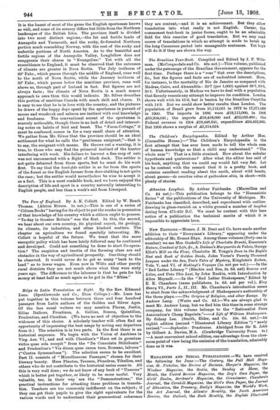Helps to Latin Translation at Sight. By the Rev. Edmund
Luce. (Spottiswoode and Co., Eton College.) —Mr. Luce has put together in this volume between three and four hundred passages from Latin authors of the Golden and Silver Ages. Of the less usual writers we may mention Floras, Justin, Silius Italicns, Frontinus, A. Gellius, Seneca, Qnintilian, Prudentius, and Claudian. (We have no sort of objection to the wideness of this choice. A scholarly teacher will often find an opportunity of impressing the best usage by noting any departure from it.) The selection is in two parts. In the first there is an historical sequence. We begin with the Vision of Anchises in Virg. Aen. VI., and end with Clandian's "Haeo est in gremium victos quae cola recepit " from the " De Consulatu Stilichonie and Prndentius's " Vis dicam quae cause tuos, Romane, labores " ("Contra Symmachum"). The selection seems to be excellent. Part II. consists of " Miscellaneous Passages," chosen for their literary beauty. Here Plautus, Terence, Phaedrus, Tibullus, and others who do not contribute to the historical series come in. All this is very well done ; we do not know of any book of "Unseens" which is better put together, or likely to be more useful. Very valuable, too, in their way are the "Demonstrations," the practical instructions for attacking these problems in transla- tion. Teachers are too commonly indifferent on the subject; if they can get their pupils to give the right equivalents for the various words and to understand their grammatical coherence
they are content,—and it is an achievement. But they allow translation into what really is not English. Caesar, the commonest text-book in junior forms, ought to be an admirable field for this exercise of good translation. But we may read scores of translations in which no attempt is made to break up the long Caesarean period into manageable sentences. Yet boys will do it if they are shown the way.






































 Previous page
Previous page